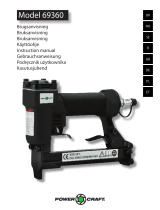
22
ENGLISH
8 Use appropriate tool
The intended use is described in this instruction
manual. Do not force small tools or attachments
to do the job of a heavy-duty tool. The tool will
do the job better and safer at the rate for which it
was intended.
Warning! The use of any accessory or
attachment or performance of any operation with
this tool, other than those recommended in this
instruction manual may present a risk of personal
injury.
9 Maintain tools with care
Keep the tools in good condition and clean for
better and safer performance. Follow the
instructions for maintenance and changing
accessories. Keep all controls dry, clean and free
from oil and grease.
10 Check for damaged parts
Before using the tool, carefully check it for damage
to ensure that it will operate properly and perform
its intended function. Check for misalignment
and seizure of moving parts, breakage of parts
and any other conditions that may affect its
operation. Have damaged guards or other
defective parts repaired or replaced as instructed.
11 Have your tool repaired by an authorized
DEWALT repair agent
This tool is in accordance with the relevant safety
regulations. To avoid danger, tools must only be
repaired by qualified technicians.
Additional safety instructions for pneumatic nailers
• Always wear safety glasses.
• Always wear ear protection.
• Only use fasteners of the type specified in
the manual.
• Do not use any stands for mounting the tool to
a support.
• Never use the tool for any other purpose than
specified in this manual.
• Prior to each operation check that the safety and
triggering mechanism is functioning properly and
that all nuts and bolts are tight.
• Use quick-action couplings for connection to the
compressed air system. The non-sealable nipple
must be fitted to the tool in such a way that no
compressed air remains in the tool after
disconnection.
• Always use clean, dry compressed air.
Do not use oxygen or combustible gases as an
energy source for this tool.
• Only connect this tool to an air supply where the
maximum allowable pressure of the tool cannot
be exceeded by more than 10%. In case of
higher pressures, a pressure reducing valve
including a downstream safety valve shall be built
into the compressed air supply.
• Only use hoses with a rating exceeding the
maximum operating pressure of the tool.
• Before transporting the tool, disconnect it from
the compressed air system, especially where
ladders are used or where unusual physical
posture is adopted while moving.
• Disconnect the tool from the air supply when it is
not in use.
• Avoid weakening or damaging the tool,
for example by:
- punching or engraving
- modifications not authorised by the manufacturer
- guiding against templates made of hard
material such as steel
- dropping or pushing across the floor
- applying excessive force of any kind
• Do not use the equipment as a hammer.
• Never point any operational fastener driving tool
at yourself or at any other person.
• While working, hold the tool in such a way that
no injuries can be caused to the head or to the
body in the event of a possible recoil due to a
disruption in the energy supply or hard areas
within the workpiece.
• Never actuate the fastener driving tool into free
space.
• In the work area, carry the tool at the workplace
using only one handle, and never with the trigger
actuated.
• Consider the conditions in the work area.
Fasteners can penetrate thin workpieces or slip
off corners and edges of the workpiece, and thus
put people at risk.
• Do not drive fasteners close to the edge of the
workpiece.
• Do not drive fasteners on top of other fasteners.
• Only use spare parts specified by the
manufacturer or his authorised agents.









